1992 VOLKSWAGEN TRANSPORTER check engine light
[x] Cancel search: check engine lightPage 80 of 164
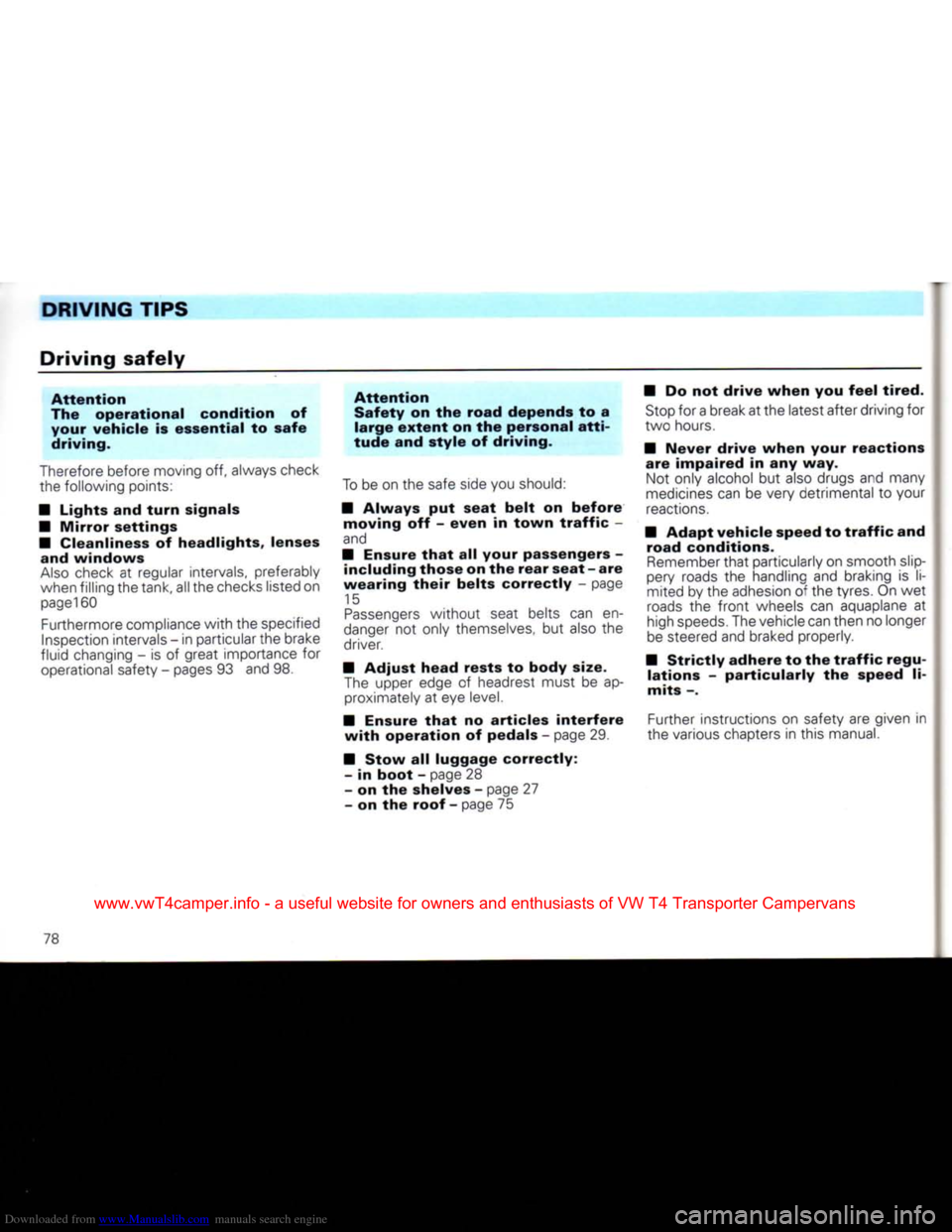
Downloaded from www.Manualslib.com manuals search engine
DRIVING
TIPS
Driving
safely
Attention
The
operational
condition of your
vehicle
is
essential
to
safe
driving.
Therefore before moving off, always check
the following points:
• Lights and
turn
signals
•
Mirror
settings
• Cleanliness of
headlights,
lenses and
windows
Also
check at regular intervals, preferably
when filling the tank, all the checks listed on
page160
Furthermore compliance
with
the specified Inspection intervals - in particular the brake
fluid changing - is of great importance for operational safety - pages 93 and 98.
Attention
Safety
on the
road
depends to a
large
extent
on the personal
atti
tude
and
style
of driving.
To
be on the safe side you should:
•
Always
put
seat
belt
on
before
moving
off -
even
in
town
traffic
-
and
• Ensure
that
all your passengers - including
those
on the
rear
seat
- are
wearing
their
belts
correctly
- page
15
Passengers
without seat belts can en
danger
not only themselves, but also the
driver.
•
Adjust
head
rests
to body size.
The
upper edge of headrest must be approximately at eye
level.
• Ensure
that
no
articles
interfere
with
operation
of pedals - page 29
•
Stow
all
luggage
correctly:
- in
boot
- page 28
- on the shelves - page 27
- on the
roof
- page 75 • Do not
drive
when
you
feel
tired.
Stop
for a break at the latest after driving for
two hours.
•
Never
drive
when
your
reactions
are
impaired
in any way. Not only alcohol but also drugs and many
medicines
can be very detrimental to your
reactions.
•
Adapt
vehicle
speed to
traffic
and
road
conditions.
Remember
that
particularly on smooth slip
pery roads the handling and braking is li
mited by the adhesion of the tyres. On wet
roads
the
front
wheels can aquaplane at
high
speeds.
The vehicle can then no longer
be
steered and braked properly.
•
Strictly
adhere
to the
traffic
regu
lations
-
particularly
the speed li
mits
-.
Further instructions on safety are given in
the various chapters in this manual.
78
www.vwT4camper.info - a useful website for owners and enthusiasts of VW T4 Transporter Campervans
Page 82 of 164

Downloaded from www.Manualslib.com manuals search engine
DRIVING
TIPS
The technical
prerequisites
"or
a low fuel consumption and efficiency were "built in" at the factory. Particular im
portance was placed on the lowest possible
disturbance
to the environment. To retain
and
make the best possible use of these
characteristics
attention should be paid to
the following points:
Vehicles
fitted
with
a
catalytic
converter
may
only
be
driven
on
unleaded
petrol.
Even
those
vehicles
which
do
not
have
a
catalytic
converter
should
be
driven
on
unleaded
petrol
for the
sake
of the
environment.
The
prescribed
maintenance
operations
should
be
carried
out
exactly
as
specified
in the
Service
Schedule - see
also
page
93.
Having your vehicle regularly serviced by
a Volkswagen dealer not
only
ensures
that
it is always operationally fit, but it
also ensures economy, lowest possible burden on the environment and a long
service
life.
Check the
tyre
pressures
every
4
weeks.
Low
tyre
pressures increase the rolling
resistance.
This not
only
increases the
fuel
consumption and
tyre
wear,
but the
handling is also impaired.
Do not
carry
unnecessary
ballast
in the
luggage
boot
Particularly in
town
traffic
when one has to accelerate
often,
weight
has a
great
in
fluence on the
fuel
consumption. As a
rule
of
thumb:
For every 100 kg of
weight
the consumption increases by approxi
mately
litre
per 100 km.
Remove
roof
rack
immediately
after
use
Particularly at
high
speeds the increased
air resistance makes
itself
felt
consider
ably.
gCK
Electrical
consumers
should
only
be
switched
on
when
they
are
actually
required
Heated rear windows, additional driving
lights
and heater blower consume a con
siderable amount of
current.
The higher
alternator
load
also increases the
fuel
consumption. For instance, over a period of 10 hours, the heated rear window
will
increase
the
fuel
consumption by ap
proximately 1
litre.
Check the
fuel
consumption
reg
ularly
The
fuel
consumption should be checked
each
time
the
tank
is
filled
up. By doing
this
inconsistencies on the vehicle which
lead to an increased
fuel
consumption
can be discovered sooner.
• Check the
engine
oil
level
each
time
the
tank
is
filled
up
The
oil consumption depends to a great ex
tent
on the engine load and
speed.
Depend
ing on the style of driving the consumption
can
be as much as 1.0 litres/1000 km.
It is normal for the oil consumption of a new
engine
to reach its lowest level after a cer
tain mileage has been covered. The
con
sumption cannot be properly
assessed
until
the vehicle has run approx. 5000 km.
This
also
applies to the fuel consumption
and
the engine output.
www.vwT4camper.info - a useful website for owners and enthusiasts of VW T4 Transporter Campervans
Page 85 of 164

Downloaded from www.Manualslib.com manuals search engine
DRIVING
TIPS
• Where possible make
full
use of the maximum permissible drawbar weight on
call
of the towing bracket - see page 151 -
cut do not exceed it.
• While observing the permissible trailer
and
drawbar weight, distribute the load in
the trailer so
that
heavy objects are as near
as
possible to the axle. The objects must
a
so be secured so
that
they cannot slip
aoout.
• Check the
tyre
pressures on the towing
/ehicle
and the trailer.
• The headlight settings, should be
:hecked
with
trailer attached before mov- ng off and adjusted as necessary.
On
vehicles
with
headlight beam control it
is
only necessary to
turn
the knurled disc in
:ash
in the appropriate direction.
Driving
instructions
To
obtain the best possible handling of ve
hicle
and trailer, the following should be
noted:
• Try to avoid driving
with
an unladen ve
hicle
and a loaded trailer. If this cannot be
avoided,
only drive slowly to allow for the unfavourable weight distribution.
• As driving stability of vehicle and trailer
decreases
when the speed increases do not
drive at the maximum permissible top
speed
in unfavourable road, weather or
wind conditions - particularly when going downhill. In any
case
the speed must be reduced im
mediately the trailer shows the slightest
sign
of snaking. On no account try to stop
the snaking by accelerating.
• For safety reasons one should not drive faster than 80 km/h (50 mph). This also
applies
in countries where higher speeds
are permitted. • Always brake in good time. If the trailer
has
an overrun brake, apply the brakes gen
tly at
first
then firmly. This will avoid the
jerk
ing caused by the trailer wheels locking.
Change
down before going down a steep hill so
that
the engine can act as a brake.
• When a long climb in a low gear
with
ex tremely high engine revs must be nego
tiated at exceptionally high ambient temperatures the coolant temperature gauge must be observed. When the gauge needle
moves
to the
>~zza'
e~z of :ne
scale,
the road speed must be reduced immediately. If nevertheless ~g amp flashes,
stop immediately and si ow the engine to
cool
off at idling speed for several minutes.
• The cooling effect of the radiator fan
can
not be increased by changing down, be
cause
the speec of t~e
~a~
s ~o! dependent
on the engine
speed.
One should therefore not change down even when towing a
trailer as long as :-e e-g -e zar cope with out the vehicle speed dropping too much.
83
www.vwT4camper.info - a useful website for owners and enthusiasts of VW T4 Transporter Campervans
Page 96 of 164
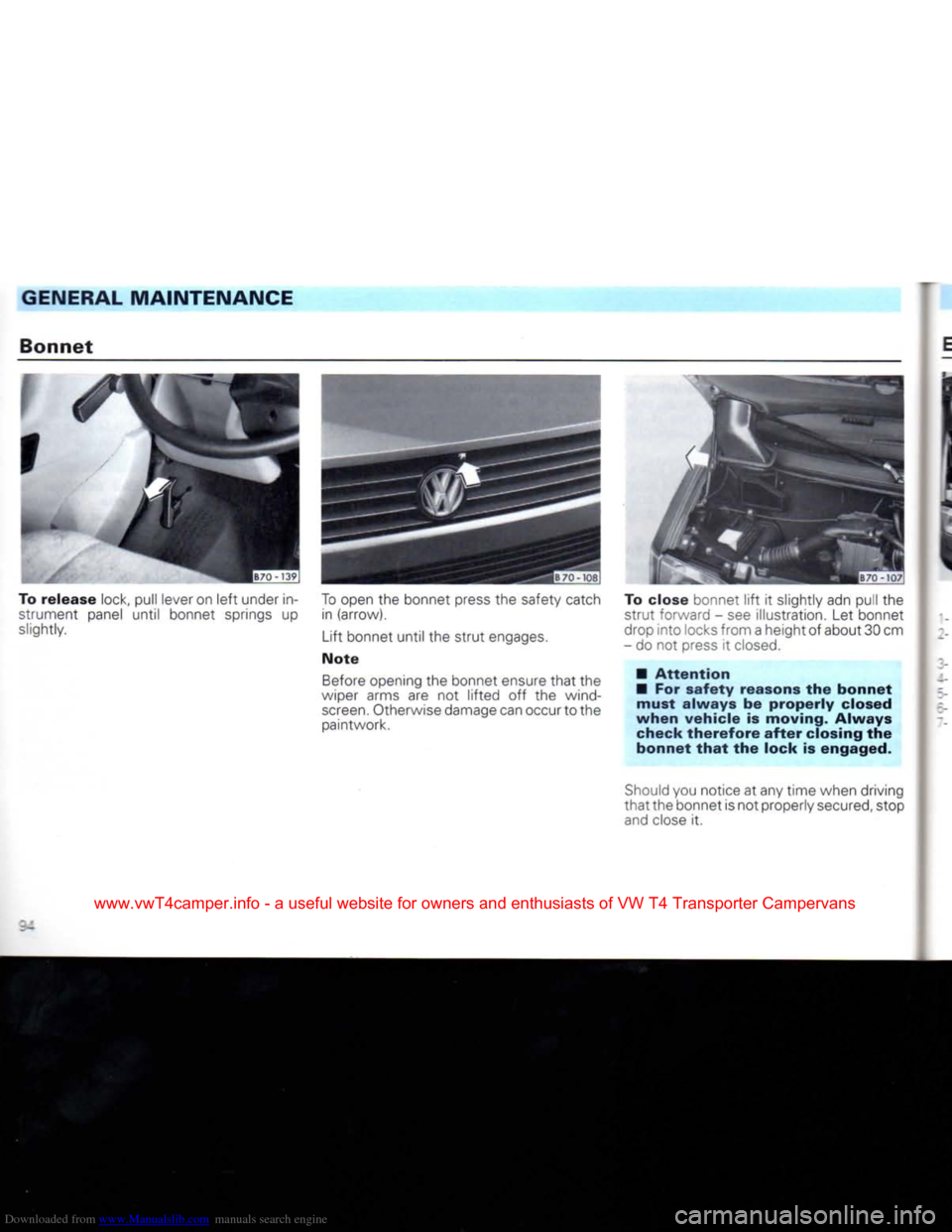
Downloaded from www.Manualslib.com manuals search engine
GENERAL
MAINTENANCE
Bonnet
To
release
lock, pull lever on
left
under in strument panel until bonnet springs up
slightly.
To
open the bonnet press the safety catch
in (arrow).
Lift bonnet until the strut engages.
Note
Before
opening the bonnet ensure that the
wiper arms are not lifted off the wind
screen.
Otherwise damage can occurto the paintwork. To close bonnet
lift
it slightly adn pull the
strut forward - see illustration. Let bonnet
drop into locks from a height of about 30 cm
- do not press it
closed.
•
Attention
• For
safety
reasons the
bonnet
must
always
be
properly
closed
when
vehicle is moving. Always
check
therefore
after
closing the
bonnet
that
the lock is engaged.
Should
you notice at any time when driving
that the bonnet is not properly
secured,
stop
and
close it.
www.vwT4camper.info - a useful website for owners and enthusiasts of VW T4 Transporter Campervans
Page 104 of 164
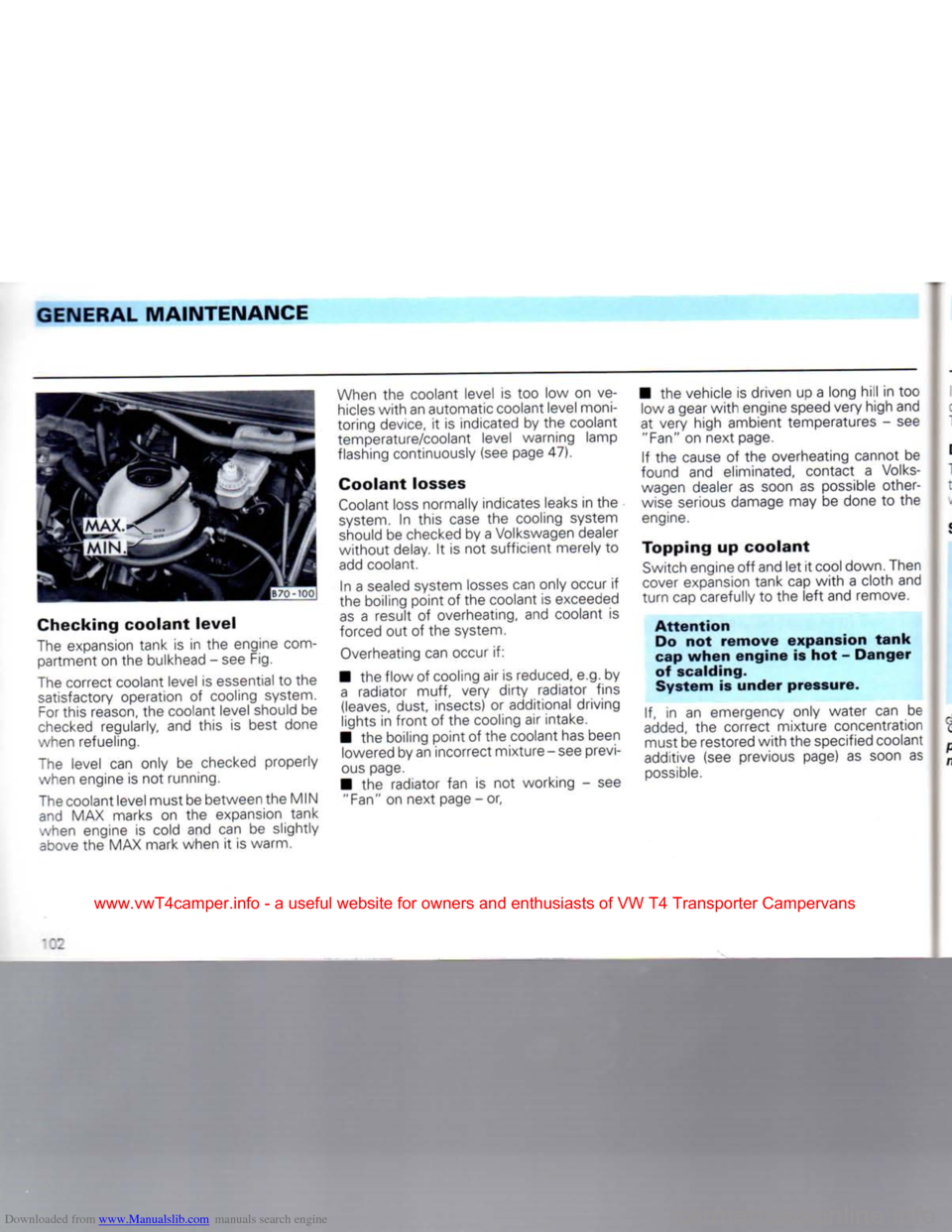
Downloaded from www.Manualslib.com manuals search engine
GENERAL
MAINTENANCE
Checking
coolant
level
The
expansion tank
is in the
engine
com
partment on the bulkhead
-
see Fig.
The
correct coolant level
is
essential
to
the satisfactory operation
of
cooling system.
For
this reason, the coolant level should
be
checked
regularly,
and
this
is
best done
when refueling.
The
level
can
only
be
checked properly
when engine
is
not running.
The
coolant level must be between the MIN
and
MAX marks
on the
expansion tank
when engine
is
cold
and can be
slightly
above
the MAX mark when
it
is warm.
When
the
coolant level
is too low on ve
hicles
with
an automatic coolant level moni
toring device,
it is
indicated by the coolant
temperature/coolant level warning lamp
flashing continuously (see page 47).
Coolant
losses
Coolant
loss normally indicates leaks in the
system.
In
this
case
the
cooling system
should
be checked by a Volkswagen dealer
without
delay.
It is
not sufficient merely
to
add
coolant.
In
a
sealed system
losses
can only occur
if
the boiling point
of
the coolant is exceeded
as
a
result
of
overheating, and coolant
is
forced out
of
the system.
Overheating can occur
if:
• the flow
of
cooling air is reduced, e.g.
by
a
radiator
muff,
very
dirty
radiator fins
(leaves,
dust, insects)
or
additional driving
lights
in
front
of
the cooling air intake.
• the boiling point
of
the coolant has been lowered by an incorrect mixture
-
see previ
ous
page.
•
the
radiator
fan is not
working
- see
"Fan"
on next page
-
or, • the vehicle
is
driven up
a
long hill
in too
low a gear
with
engine speed very high and
at very high ambient temperatures
-
see
"Fan"
on
next page.
If
the
cause
of the
overheating cannot
be
found
and
eliminated, contact
a
Volks
wagen dealer
as
soon
as
possible other
wise
serious damage may
be
done
to the
engine.
Topping
up
coolant
Switch
engine
off
and let
it
cool down. Then
cover
expansion tank cap
with
a
cloth and
turn
cap carefully
to
the
left
and remove.
Attention
Do
not
remove
expansion
tank
cap
when
engine
is
hot
-
Danger
of scalding.
System
is
under
pressure.
If, in an
emergency only water
can be
added,
the
correct mixture concentration must be restored
with
the specified coolant
additive (see previous page)
as
soon
as
possible.
•02
www.vwT4camper.info - a useful website for owners and enthusiasts of VW T4 Transporter Campervans
Page 107 of 164
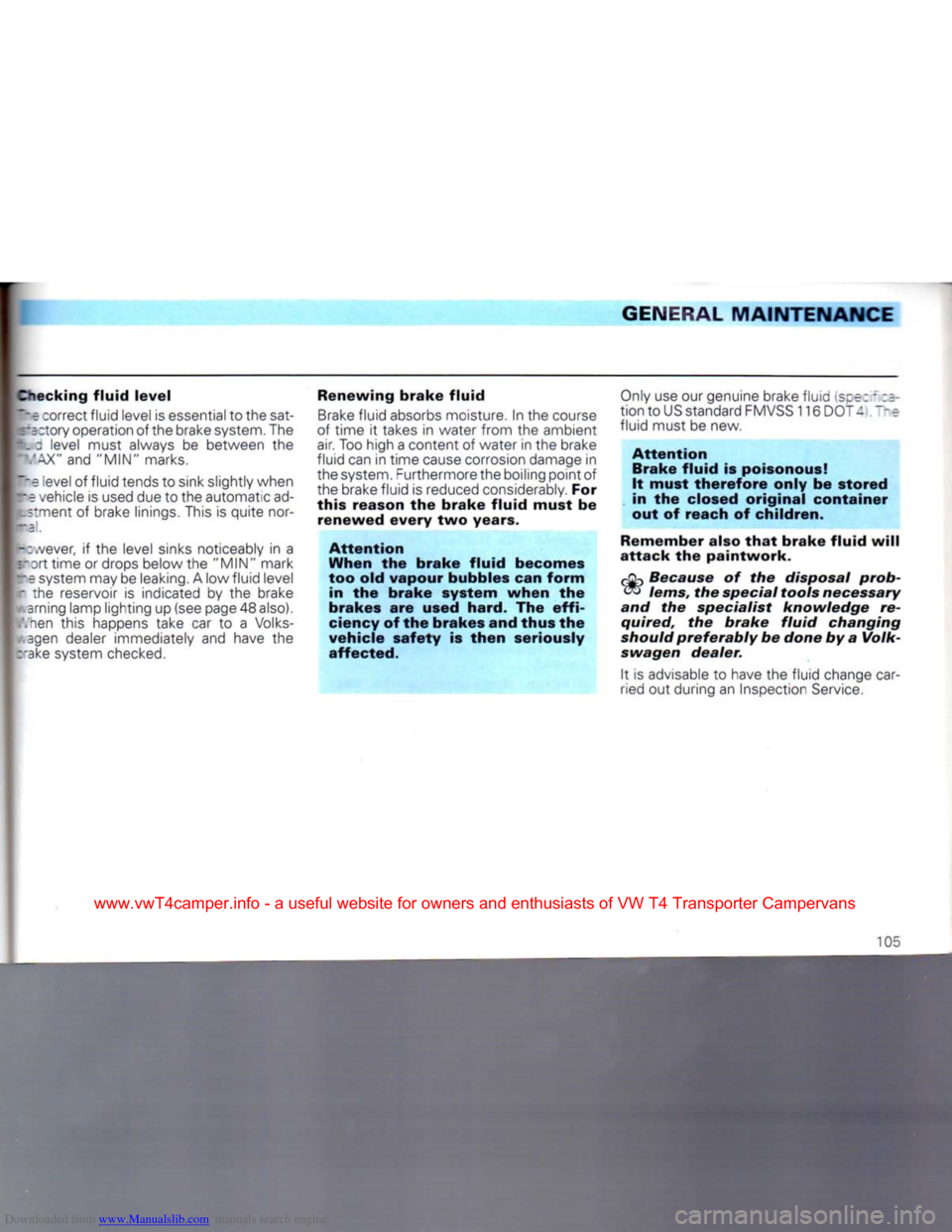
Downloaded from www.Manualslib.com manuals search engine
GENERAL
MAINTENANCE
'necking fluid level
Pe :orrect fluid level is essential to the sat-
:~=
:tory operation of the brake system. The
fc. Z level must always be between the
AX"
and "MIN" marks.
~- a "evel of fluid tends to sink slightly when
"a vehicle is used due to the automatic ad- ::ment of brake linings. This is quite nor-
-rwever, if the level sinks noticeably in a
srorttime or drops below the "MIN" mark
re system may be leaking. A low fluid level " the reservoir is indicated by the brake
w.arning lamp lighting up (see page 48 also), .nen this happens take car to a Volks
wagen dealer immediately and have the
cake system checked. Renewing brake fluid
Brake fluid absorbs moisture. In the course
of time it takes in water from the ambient
air. Too high a content of water in the brake
fluid can in time cause corrosion damage in
the system. Furthermore the boiling point of
the brake fluid is reduced considerably. For
this reason the brake fluid must be renewed every two years.
Attention
When the brake fluid becomes
too old vapour bubbles can form in the brake system when the
brakes are used hard. The
effi
ciency of the brakes and thus the
vehicle safety is then seriously
affected.
Only use our genuine brake fluio (see: - ra
tion to US standard FMVSS 116 DO~-
.
~-e
fluid must be new.
Attention Brake fluid is poisonous!
It must therefore only be stored in the closed original container
out of reach of children.
Remember also that brake fluid will
attack the paintwork. Because of the disposal
prob
lems,
the special tools necessary
and the specialist knowledge re
quired,
the brake fluid changing
should preferably be done by a
Volk
swagen
dealer.
It is advisable to have the fluid change car
ried out during an Inspection Service.
www.vwT4camper.info - a useful website for owners and enthusiasts of VW T4 Transporter Campervans
Page 110 of 164
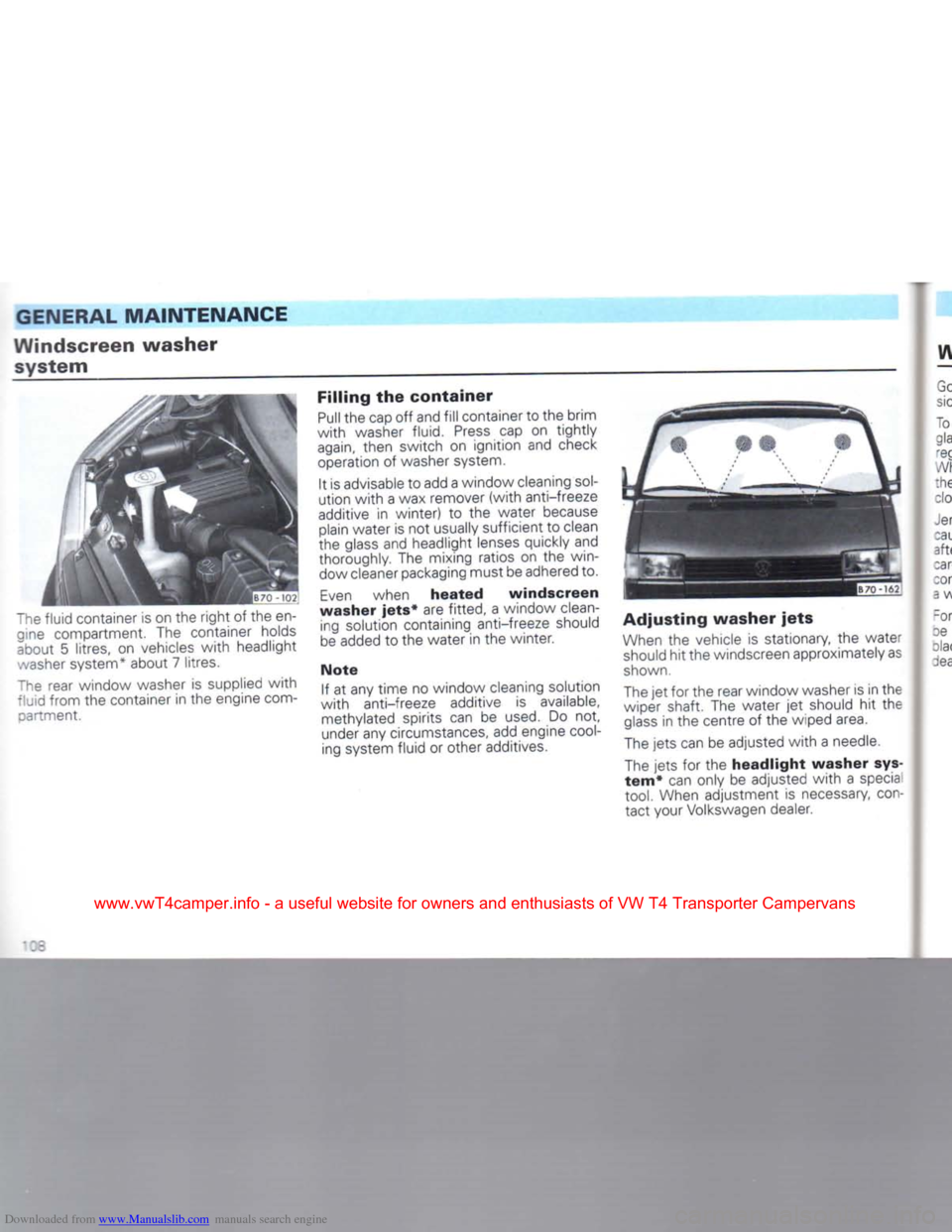
Downloaded from www.Manualslib.com manuals search engine
GENERAL
MAINTENANCE
Windscreen
washer
system
"he fluid container is on the
right
of the en gine compartment. The container holds
about 5 litres, on vehicles
with
headlight
washer
system* about 7 litres.
The
rear window washer is supplied
with
fluid from the container in the engine com-oartment. Filling the
container
Pull
the cap off and
fill
container to the brim
with
washer fluid.
Press
cap on
tightly
again,
then switch on ignition and check
operation of washer system.
It is advisable to add a window cleaning
sol
ution
with
a wax remover
(with
anti-freeze
additive in winter) to the water because plain water is not usually sufficient to clean
the glass and headlight lenses quickly and
thoroughly. The mixing ratios on the win dow cleaner packaging must be adhered to.
Even
when
heated
windscreen
washer
jets*
are fitted, a window clean ing solution containing anti-freeze should
be
added to the water in the winter.
Note
If at any time no window cleaning solution
with
anti-freeze additive is available, methylated spirits can be
used.
Do not,
under any circumstances, add engine
cool
ing system fluid or other additives.
Adjusting
washer
jets
When
the vehicle is stationary, the water
should
hit the windscreen approximately as
shown.
The
jet for the rear window washer is in the
wiper shaft. The water jet should hit the
glass
in the centre of the wiped area.
The
jets can be adjusted
with
a needle.
The
jets for the
headlight
washer
sys
tem*
can only be adjusted
with
a specia
tool.
When adjustment is necessary,
con
tact your Volkswagen dealer.
:=
www.vwT4camper.info - a useful website for owners and enthusiasts of VW T4 Transporter Campervans
Page 117 of 164
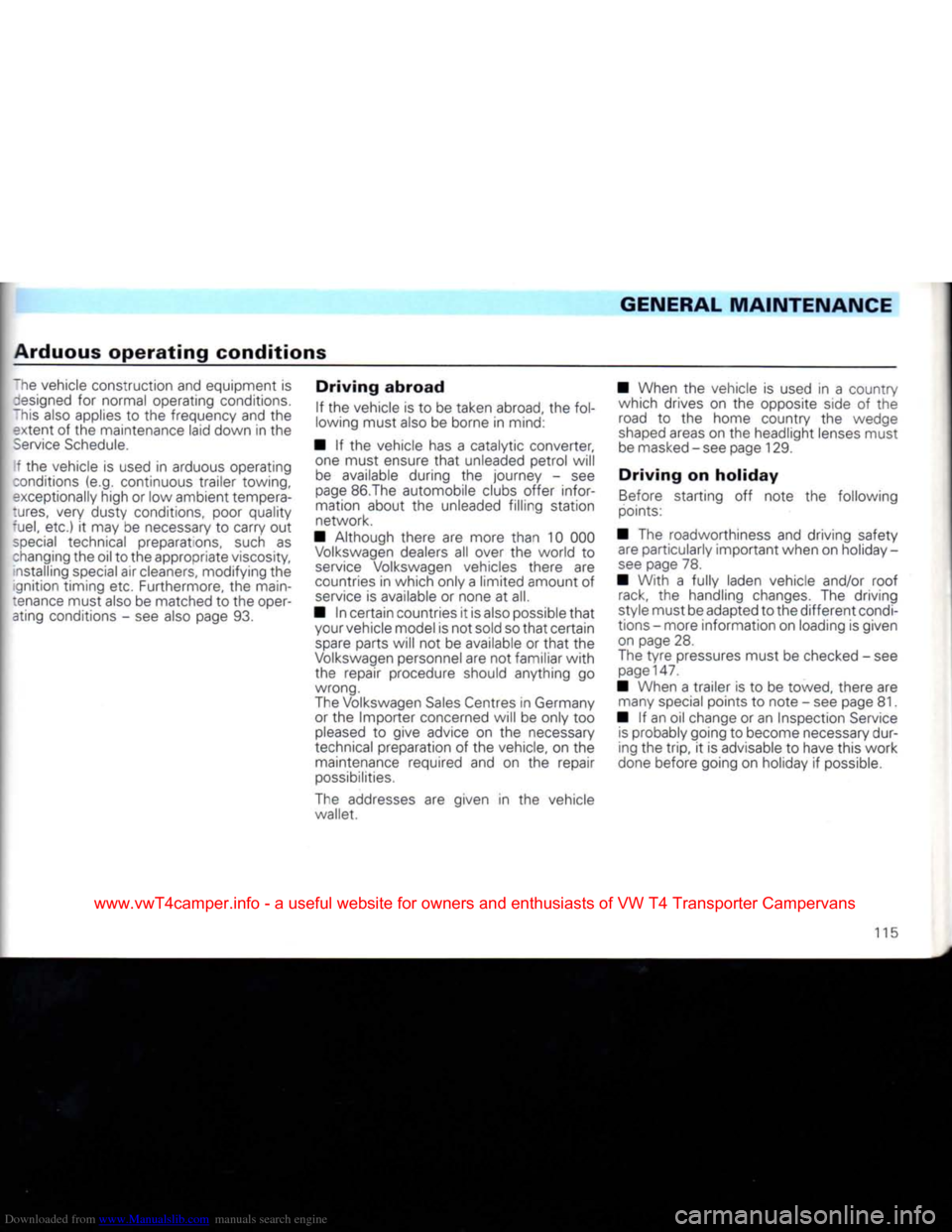
Downloaded from www.Manualslib.com manuals search engine
GENERAL
MAINTENANCE
Arduous
operating
conditions
ne vehicle construction and equipment is
resigned for normal operating conditions.
his also applies to the frequency and the
extent of the maintenance laid down in the
service
Schedule.
f the vehicle is used in arduous operating
conditions (e.g. continuous trailer towing,
exceptionally high or low ambient tempera-
:ures,
very dusty conditions, poor quality
ruel,
etc.) it may be necessary to carry out
special
technical preparations, such as ;hanging the oil to the appropriate viscosity, ^stalling special air cleaners, modifying the
ignition timing etc. Furthermore, the main
tenance must also be matched to the oper
ating conditions - see also page 93.
Driving
abroad
If the vehicle is to be taken abroad, the fol
lowing must also be borne in mind:
• If the vehicle has a catalytic converter, one must ensure
that
unleaded petrol will be available during the journey - see
page 86.The automobile clubs offer infor mation about the unleaded filling station
network.
• Although there are more than 10 000
Volkswagen
dealers all over the world to
service
Volkswagen vehicles there are
countries in which only a limited amount of
service
is available or none at all.
• In certain countries it is also possible
that
your vehicle model is not soid so
that
certain
spare
parts will not be available or
that
the
Volkswagen
personnel are not familiar
with
the repair procedure should anything go
wrong.
The Volkswagen
Sales
Centres in Germany or the
Importer
concerned will be only too
pleased
to give advice on the necessary
technical preparation of the vehicle, on the maintenance required and on the repair
possibilities.
The addresses are given in the vehicle wallet. • When the vehicle is used in a country
which drives on the opposite side of the road to the home country the wedge
shaped
areas on the headlight lenses must be masked - see page 129.
Driving
on
holiday
Before starting off note the following
points:
• The roadworthiness and driving safety are particularly important when on holiday-
see
page 78.
• With a fully laden vehicle and/or roof rack, the handling changes. The driving
style must be adapted to the different condi
tions - more information on loading is given
on page 28.
The
tyre
pressures must be checked - see
page147.
• When a trailer is to be towed, there are many special points to note - see page 81.
• If an oil change or an Inspection Service
is
probably going to become necessary dur
ing the
trip,
it is advisable to have this work
done before going on holiday if possible.
115
www.vwT4camper.info - a useful website for owners and enthusiasts of VW T4 Transporter Campervans